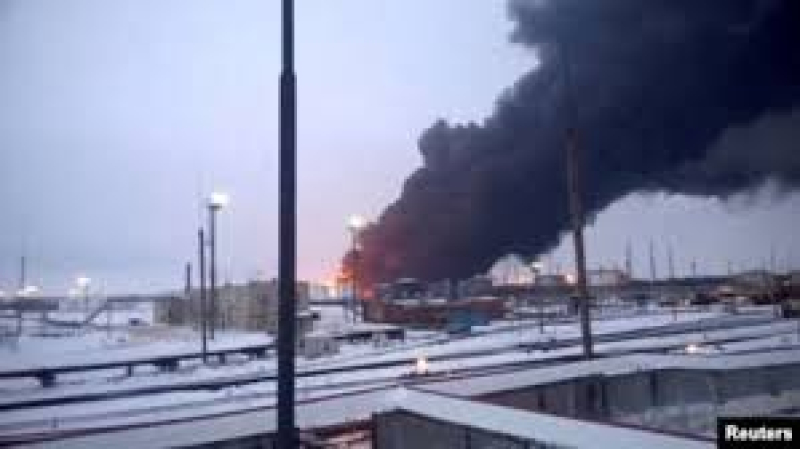- Nation Votes Tomorrow in 13th Poll, Referendum |
- Key in your hands, use it wisely: Prof Yunus tells voters |
- Yunus Urges Voters to Shape a ‘New Bangladesh’ |
- Bangladesh Polls: Campaign Ends as Voters Weigh Pledges |
- Bangladesh Heads to First Gen Z-Driven Competitive Poll |
Ukrainian Drones Strike Russia's Oil Revenues

A recent series of Ukrainian drone and missile strikes targeting Russian oil refineries has significantly hurt Moscow’s processing capacity, according to analysts.
The strikes, which come as Kyiv and its allies aim to deprive Russia of a main source of revenue for funding its invasion of Ukraine, have reduced Moscow’s overall oil processing capacity by 370,500 barrels per day, or 7% of its total output, according to calculations by Reuters.
The Ryazan oil refinery was set on fire after a drone attack March 13, forcing the shutdown of two damaged primary oil refining units. The plant, which is located south of Moscow, produces around 317,000 barrels per day, or 5.8% of Russia’s total refined crude oil, reports VOA.
Video footage posted online showed a Ukrainian drone flying through a smoke-filled sky above the refinery, before circling and crashing into the plant, causing a loud explosion.
Another drone attack on March 12 targeted the NORSI refinery near the city of Nizhny Novgorod, some 430 kilometers east of Moscow, knocking out half of the plant’s refining capacity, according to sources quoted by Reuters.
Kyiv claims to have targeted at least seven different refineries. Several are in the region bordering Ukraine.
“Wars take huge amounts of diesel fuel for tanks, for trucks and so forth. And so that region is directly responsible for diesel for the war,” noted Thomas O’Donnell, an energy and geopolitics analyst with the Hertie School of Governance in Berlin.
The attacks on refineries further to the north of Russia are also aimed at reducing Moscow’s revenue from hydrocarbon exports.
“By hitting refineries up there, what happens is the diesel that they export — they were exporting almost as much diesel before as oil — that’s being destroyed, and they have to shift it to oil if they want to make money on that,” O’Donnell told VOA.
Ukrainian President Volodymyr Zelenskyy praised the military’s growing drone capabilities in the wake of last week’s attacks.
“In recent weeks, many have already seen that the Russian war machine has vulnerabilities and that we can exploit these vulnerabilities with our weapons,” Zelenskyy said in his nightly video address on March 16. “What our own drones can do is truly a long-range Ukrainian capability. Ukraine will now always have its own striking force in the sky.”
The Ukrainian strikes combined with the Western price cap of $60 per barrel on Russian oil could add to the pressure the Kremlin is facing. Buyers who do not adhere to the cap are prevented from using Western services like insurance and shipping. Since November, Western nations have toughened their monitoring of compliance with the measures.
Russia has used a fleet of “shadow” tankers to move its oil around the world, with much of it travelling through the Baltic Sea or the Arctic. That presents an opportunity for Ukraine’s allies, says analyst O’Donnell.
“The tankers themselves are very old and rather sketchy. They could be stopped in the straits, in the territorial waters between Denmark and Sweden, and be inspected, legally,” he told VOA. “And the inspectors could say, ‘this isn’t good enough insurance,’ or ‘these ships aren’t of proper quality to be carrying this oil,’ and make them turn around. That would be a dramatic intervention.”

